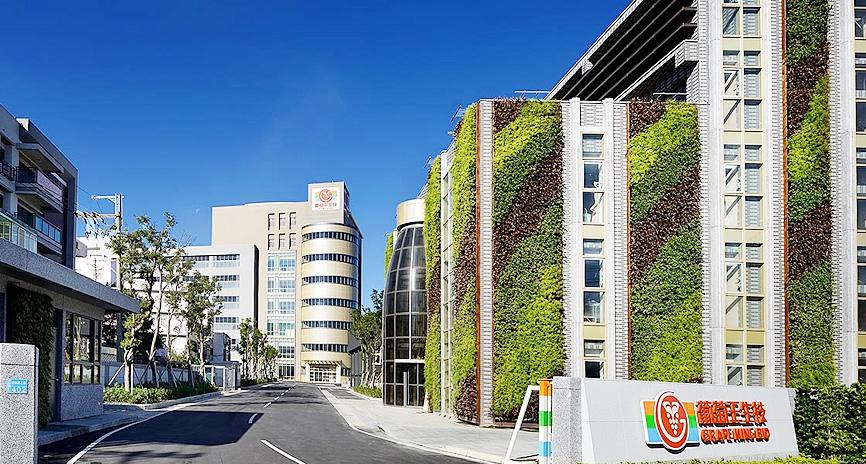Grape King Bio Ltd’s (葡萄王) board of directors on Friday approved a private placement from Uni-President Enterprises Corp (統一企業), giving it an 8 percent stake in the nutritional supplement firm.
In the deal, Grape King would issue up to 11.851 million new common shares to Uni-President, which would become a strategic investor, the Taoyuan-based supplier of probiotics and mycelium health foods said in a statement.
Unlike a public offering, an investor in a private placement is subject to a three-year lockup period, it said.

Photo courtesy of Grape King Bio Ltd
The deal is expected to further bolster their collaboration in the food and beverage, and health and wellness sectors, Grape King said.
“This strategic collaboration will be a key driver of growth for Grape King Bio,” chairman and CEO Andrew Tseng (曾盛麟) said. “We are confident that the combination of Uni-President’s know-how in running successful multinational food and beverage and retail businesses, along with Grape King’s expertise in health supplements, will yield attractive growth opportunities.”
Uni-President, the nation’s largest food and beverage conglomerate, said in its regulatory filing that its board of directors had agreed to the private placement at a cost no higher than NT$2.015 billion (US$69.94 million).
The deal comes as many nations face aging populations and businesses have seen a greater demand for preventive care, while the partnership would allow both firms to leverage their respective expertise in products and services, distribution networks, manufacturing, marketing and food safety.
“This collaboration will ensure that overseas expansions can be achieved more rapidly utilizing Uni-President’s overseas production plants to manufacture high-quality products for global healthcare markets,” Grape King said.
The company would share its knowledge and experience in supplements and biotechnology with Uni-President, and help its partner expand its offerings in the health and wellness sector, it said.
Grape King’s Taiwan Accreditation Foundation-certified laboratory and Uni-President’s food safety center would work together to improve food safety systems, ensure zero risk to food safety and promote superior food quality, it said.
The private placement is expected to be completed after gaining shareholders’ approval in an extraordinary general meeting on Jan. 14, as well as regulatory approval, it added.
Grape King reported cumulative revenue of NT$7.16 billion in the first 10 months of the year, down 2.26 percent from NT$7.32 billion a year earlier.
Net profit in the first three quarters totaled NT$851.11 million, down from NT$880.88 million a year earlier, or earnings per share of NT$6.25.
Uni-President’s major subsidiaries include President Chain Store Corp (統一超商) in Taiwan and Uni-President China Holdings Ltd (統一中國控股) in China.
The Tainan-based company also operates President Pharmaceutical Corp (統一藥品), fitness and spa center operator Being Corp (統一佳佳) and President Drugstore Business Corp (統一生活事業), which owns the nation’s second-largest drugstore chain, Cosmed (康是美).
In the first 10 months of the year, Uni-President’s cumulative revenue totaled NT$377.28 billion, down 0.8 percent from NT$380.33 billion a year earlier.
Net profit in the first three quarters increased from NT$16.193 billion to NT$17.999 billion, or earnings per share of NT$3.17.

Taiwan Semiconductor Manufacturing Co (TSMC, 台積電) would not produce its most advanced technologies in the US next year, Minister of Economic Affairs J.W. Kuo (郭智輝) said yesterday. Kuo made the comment during an appearance at the legislature, hours after the chipmaker announced that it would invest an additional US$100 billion to expand its manufacturing operations in the US. Asked by Taiwan People’s Party Legislator-at-large Chang Chi-kai (張啟楷) if TSMC would allow its most advanced technologies, the yet-to-be-released 2-nanometer and 1.6-nanometer processes, to go to the US in the near term, Kuo denied it. TSMC recently opened its first US factory, which produces 4-nanometer

GREAT SUCCESS: Republican Senator Todd Young expressed surprise at Trump’s comments and said he expects the administration to keep the program running US lawmakers who helped secure billions of dollars in subsidies for domestic semiconductor manufacturing rejected US President Donald Trump’s call to revoke the 2022 CHIPS and Science Act, signaling that any repeal effort in the US Congress would fall short. US Senate Minority Leader Chuck Schumer, who negotiated the law, on Wednesday said that Trump’s demand would fail, while a top Republican proponent, US Senator Todd Young, expressed surprise at the president’s comments and said he expects the administration to keep the program running. The CHIPS Act is “essential for America leading the world in tech, leading the world in AI [artificial

REACTIONS: While most analysts were positive about TSMC’s investment, one said the US expansion could disrupt the company’s supply-demand balance Taiwan Semiconductor Manufacturing Co’s (TSMC, 台積電) new US$100 billion investment in the US would exert a positive effect on the chipmaker’s revenue in the medium term on the back of booming artificial intelligence (AI) chip demand from US chip designers, an International Data Corp (IDC) analyst said yesterday. “This is good for TSMC in terms of business expansion, as its major clients for advanced chips are US chip designers,” IDC senior semiconductor research manager Galen Zeng (曾冠瑋) said by telephone yesterday. “Besides, those US companies all consider supply chain resilience a business imperative,” Zeng said. That meant local supply would

Servers that might contain artificial intelligence (AI)-powering Nvidia Corp chips shipped from the US to Singapore ended up in Malaysia, but their actual final destination remains a mystery, Singaporean Minister for Home Affairs and Law K Shanmugam said yesterday. The US is cracking down on exports of advanced semiconductors to China, seeking to retain a competitive edge over the technology. However, Bloomberg News reported in late January that US officials were probing whether Chinese AI firm DeepSeek (深度求索) bought advanced Nvidia semiconductors through third parties in Singapore, skirting Washington’s restrictions. Shanmugam said the route of the chips emerged in the course of an